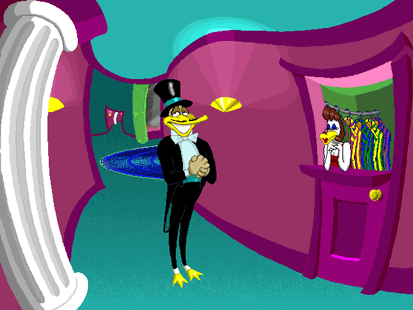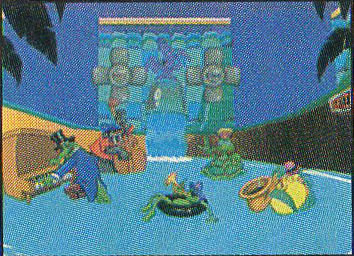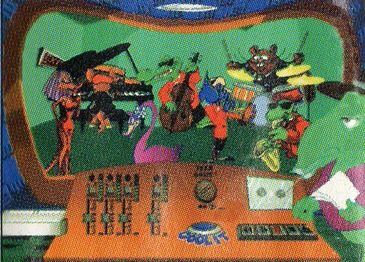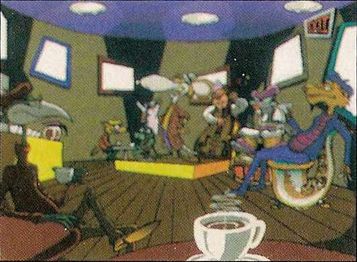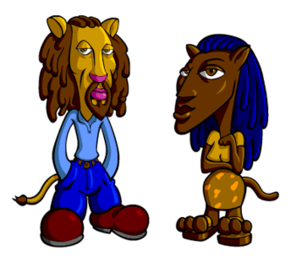Coolsville (lost build of cancelled PC adventure game; 1994-1998): Difference between revisions
No edit summary |
No edit summary |
||
| Line 1: | Line 1: | ||
{{InfoboxLost | {{InfoboxLost | ||
|title=<center>Coolsville</center> | |title=<center>Coolsville</center> | ||
|image= | |image=Coolsville Duck Ellington.png | ||
|imagecaption=A screenshot | |imagecaption=A screenshot from TRUE's website, featuring the "Duck Ellington" character. | ||
|status=<span style="color:red;">'''Lost'''</span>}} | |status=<span style="color:red;">'''Lost'''</span>}} | ||
'''''Coolsville''''' is a cancelled jazz-themed PC adventure game aimed at a children audience. | '''''Coolsville''''' is a cancelled jazz-themed PC adventure game aimed at a children audience. | ||
| Line 16: | Line 16: | ||
==Concept== | ==Concept== | ||
Although it is often presumed to be an adventure game | Although it is often presumed to be an adventure game, it is also very probable to be more of an interactive educational game; Music Pen company mostly developed educational games, most of them being ''The Magic School Bus'' licensees. | ||
According to | According to project manager Michael Duggan, it was ''"an early attempt at a kind of virtual reality--sort of animated history of soul music"'' and ''"crossed over all sorts of genres related to soul"''. | ||
== Staff == | == Staff == | ||
| Line 36: | Line 36: | ||
No prototype, demo or concrete version of the game has ever surfaced to this day. | No prototype, demo or concrete version of the game has ever surfaced to this day. | ||
<br/>Back during development, the game had previews in French video game magazines ''Joystick'' and ''Gen4'', which gave very positive feedback, strongly implying they played at least a prototype. | <br/>Back during development, the game had previews in French video game magazines ''Joystick'' and ''Gen4'', which gave very positive feedback, strongly implying they played at least a prototype. | ||
According to project manager Michael Duggan, he ''"was under the impression that there was [a prototype made] some time after [he] departed the company"''. | |||
Artist TRUE showed two high-quality screenshots on his webpage, but he only worked on a small part of the game and doesn't have more material. | Artist TRUE showed two high-quality screenshots on his webpage, but he only worked on a small part of the game and doesn't have more material. | ||
==Trademark== | |||
Music Pen trademarked the "COOLSVILLE" name as a trademark in 1996, which possibly means that they were expecting to resume development and eventually release the game. Several staff members mention in their résumé having worked at Music Pen from 1994 to 1996, which could support this theory. | Music Pen trademarked the "COOLSVILLE" name as a trademark in 1996, which possibly means that they were expecting to resume development and eventually release the game. Several staff members mention in their résumé having worked at Music Pen from 1994 to 1996, which could support this theory. | ||
<br/>However, the "COOLSVILLE" trademark was abandoned two years later without a statement of use. | <br/>However, the "COOLSVILLE" trademark was abandoned two years later without a statement of use. | ||
| Line 47: | Line 48: | ||
File:Coolsville b.jpg|A screenshot from a magazine. | File:Coolsville b.jpg|A screenshot from a magazine. | ||
File:Coolsville c.jpg|A screenshot from a magazine. | File:Coolsville c.jpg|A screenshot from a magazine. | ||
File: | File:Coolsville_beatnik.jpg|A screenshot from a magazine.. | ||
File:Coolsville char.png|Other characters designed by TRUE. | File:Coolsville char.png|Other characters designed by TRUE. | ||
</gallery> | </gallery> | ||
Revision as of 00:29, 25 July 2016
Coolsville is a cancelled jazz-themed PC adventure game aimed at a children audience.
It was meant to be released in the fall of 1994, developed by Music Pen and distributed by Media Vision.
Plot
The game is set in Coolsville, a city populated with anthropomorphic cartoon animals who are into jazz music.
Coolsville is led by a council of six gurus who reunite each year for a concert known as "The Great Gig"; this concert gives energy to the city for a year.
One of the gurus has been abducted, and the player character is set on a quest to find him, picking up musicians to form a band along the way.
Concept
Although it is often presumed to be an adventure game, it is also very probable to be more of an interactive educational game; Music Pen company mostly developed educational games, most of them being The Magic School Bus licensees.
According to project manager Michael Duggan, it was "an early attempt at a kind of virtual reality--sort of animated history of soul music" and "crossed over all sorts of genres related to soul".
Staff
- Michael Patrick Duggan: project manager/game designer.
- Brian Gaidry: art director/lead artist.
- TRUE: character designer, background designer, animator and illustrator.
- Jared Faber: musical composer.
- Mo Riza: project champion and interactive art director.
- Michael Foran: animator and designer.
- Jean Pierre Dillard: animator.
Legacy
Coolsville's release was cancelled after Media Vision closed down.
The only visual signs of its existence that have ever been made public are a few screenshots, as shown in several magazines that were published before the game was cancelled. These screenshots seem to imply that the game may also have had music-creating gameplay, as well as classic point-and-click adventure.
No prototype, demo or concrete version of the game has ever surfaced to this day.
Back during development, the game had previews in French video game magazines Joystick and Gen4, which gave very positive feedback, strongly implying they played at least a prototype.
According to project manager Michael Duggan, he "was under the impression that there was [a prototype made] some time after [he] departed the company".
Artist TRUE showed two high-quality screenshots on his webpage, but he only worked on a small part of the game and doesn't have more material.
Trademark
Music Pen trademarked the "COOLSVILLE" name as a trademark in 1996, which possibly means that they were expecting to resume development and eventually release the game. Several staff members mention in their résumé having worked at Music Pen from 1994 to 1996, which could support this theory.
However, the "COOLSVILLE" trademark was abandoned two years later without a statement of use.
References
http://www.abandonware-france.org/ltf_abandon/ltf_jeu.php?id=1476 A French website about this game's cancelled status
http://www.trueart.biz/music_pen_cd_rom_game_character_design_coolsville_1.html Artist T R U E about his work on the game.
http://www.trademarkia.com/coolsville-75065508.html Trademark status
